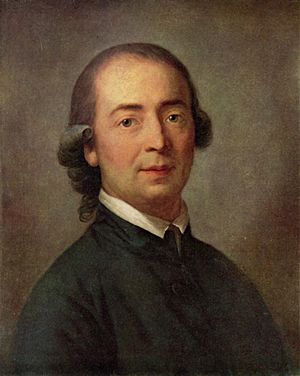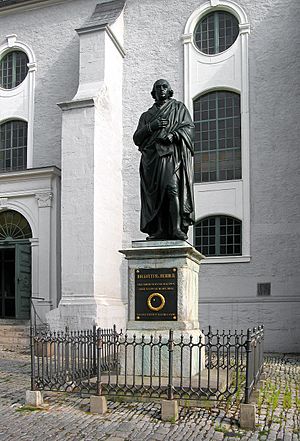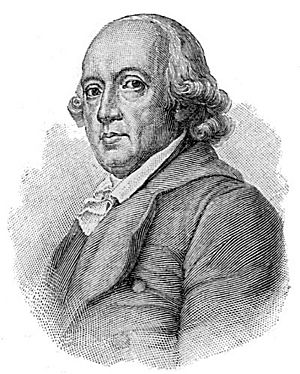Johann Gottfried Herder facts for kids
Quick facts for kids
Johann Gottfried Herder
|
|
|---|---|

Herder by Anton Graff, 1785
|
|
| Born | 25 August 1744 Mohrungen, Prussia
|
| Died | 18 December 1803 (aged 59) |
| Alma mater | University of Königsberg |
| Era | 18th-century philosophy |
| Region | Western philosophy |
| School |
|
| Academic advisors | Immanuel Kant |
|
Influences
|
|
|
Influenced
|
|
Johann Gottfried von Herder (born August 25, 1744 – died December 18, 1803) was an important German philosopher, theologian, poet, and literary critic. He was part of big movements like the Enlightenment, Sturm und Drang, and Weimar Classicism.
Contents
Herder's Life Story
Herder was born in Mohrungen, which is now in Poland. His family was not rich. He learned a lot by reading his father's Bible and songbook.
When he was 17, in 1762, he went to the University of Königsberg. There, he studied with the famous philosopher Immanuel Kant. Herder also became a student of Johann Georg Hamann, another philosopher who believed that pure logic wasn't the only way to understand the world.
Hamann's ideas had a big impact on Herder. Herder later said he had "too little reason and too much idiosyncrasy." Even though Herder was not very social, he greatly influenced people around him. One friend even called his writings "inspired by God." Many thinkers later found inspiration in Herder's ideas.
Early Career and Travels
In 1764, Herder became a clergyman and moved to Riga to teach. During this time, he wrote his first important works, which were about literary criticism.
In 1769, Herder traveled by ship to Nantes, France, and then went to Paris. This trip changed how he saw himself as a writer.
In 1770, Herder met a young writer named Johann Wolfgang von Goethe in Strasbourg. This meeting was very important for German literature. Herder's ideas about literature inspired Goethe to create his own unique style. This is seen as the start of the "Sturm und Drang" movement, which was a time of strong emotions and individualism in German art and literature.
In 1771, Herder became a head pastor and court preacher in Bückeburg.
Moving to Weimar and Family Life
By the mid-1770s, Goethe was a famous author. He used his influence to help Herder get a job as General Superintendent in Weimar. Herder moved there in 1776. His ideas then started to lean more towards classicism, a style that valued balance and order.
On May 2, 1773, Herder married Maria Karoline Flachsland. They had several children:
- Gottfried (born 1774)
- August (born 1776)
- Wilhelm Ludwig Ernst (born 1778)
- Karl Emil Adelbert (born 1779)
- Luise (born 1781)
- Emil Ernst Gottfried (born 1783)
- Rinaldo Gottfried (born 1790)
Later Years and Death
Towards the end of his life, Herder supported the French Revolution. This made many of his friends and colleagues upset. He also had a disagreement with Goethe. His strong criticisms of Kant's philosophy also made him feel more alone in his later years.
In 1802, Herder was honored by the Elector-Prince of Bavaria. This added "von" to his last name, showing he was part of the nobility. He passed away in Weimar in 1803 at the age of 59.
Herder's Main Ideas
Herder had many important ideas about language, culture, and history.
Language and Thought
In 1772, Herder published Treatise on the Origin of Language. He believed that language was much more than just words. He argued that language helps shape how each group of people thinks and feels. For Herder, language is like "the organ of thought." This means that our thoughts are closely connected to the language we use.
He also collected many traditional folk poems. This started a big interest in Germany for these old stories and songs. His collections were published in 1773 as Voices of the Peoples in Their Songs.
Culture and History
Herder believed that a poet helps create a nation's identity. He thought that the purest and most powerful poetry came from nations before they became too "civilized." He saw this in the Old Testament, the Edda, and Homer. He tried to find similar qualities in old German folk songs and Norse myths.
After 1776, Herder's ideas moved towards classicism. He wrote Outline of a Philosophical History of Humanity. In this work, he stressed that human development is shaped by physical and historical surroundings. He believed that to understand history, one must "go into the age, into the region, into the whole history, and feel one's way into everything." He thought historians should try to be like "regenerated contemporaries" of the past.
Herder gave Germans a new sense of pride in their own history and art. He thought that German art, especially Gothic art, was just as valuable as Greek art. He also said that every nation has its own standard of perfection and should not be compared to others.
Nationality and Patriotism
Herder thought that nationality and patriotism were very important. He said, "he that has lost his patriotic spirit has lost himself and the whole worlds about himself." He also believed that "in a certain sense every human perfection is national."
He saw each nation as unique, shaped by its climate, education, traditions, and history. He believed that God had "wonderfully separated nationalities" by things like mountains, seas, and especially by languages and characters.
Herder also had interesting predictions. After a trip to Ukraine, he wrote in his diary that Slavic nations would one day become very powerful in Europe. He thought Western Europeans would lose their faith, while Eastern Europeans would keep their religion and ideals. He specifically praised Ukraine, saying it would "someday awaken there a cultured nation whose influence will spread [...] throughout the world."
Herder was against absolute rule and Prussian nationalism. He wanted to combine feelings with reason. He believed that all knowledge is already in our souls. He thought that our understanding starts with simple feelings and then grows into self-awareness and logical thought.
Herder also argued that Jewish people in Germany should have the same rights as other Germans. He believed that the world owed a debt to Jews for centuries of unfair treatment. He thought this debt could be repaid by helping Jews who wanted to, to regain their own country in ancient Israel.
He also warned against too much national pride. He said, "national glory is a deceiving seducer. When it reaches a certain height, it clasps the head with an iron band. The enclosed sees nothing in the mist but his own picture; he is susceptible to no foreign impressions." This meant that too much national pride could make a nation blind to anything outside itself.
Herder believed that his idea of a nation encouraged democracy and allowed people to express their identity freely. He supported the French Revolution, which was not popular with kings and queens. He also disagreed with Kant because Kant did not connect reasoning with language. Herder thought that reasoning always depended on language.
He also promoted the idea of a person's individuality. He believed that each person is unique and deserves to be understood as an individual.
Ideas on Evolution
Some historians think Herder was a "proto-evolutionary" thinker. This means he had ideas that were similar to later theories of evolution, even if he didn't fully develop them. He talked about a "great chain of being," which is an old idea that all living things are connected in a hierarchy from simple to complex.
However, other experts disagree. They say that Herder's ideas were still influenced by the idea of divine creation. They believe he did not think that animals biologically evolved into humans.
See also
 In Spanish: Johann Gottfried Herder para niños
In Spanish: Johann Gottfried Herder para niños
- Herder Prize
 | Charles R. Drew |
 | Benjamin Banneker |
 | Jane C. Wright |
 | Roger Arliner Young |



